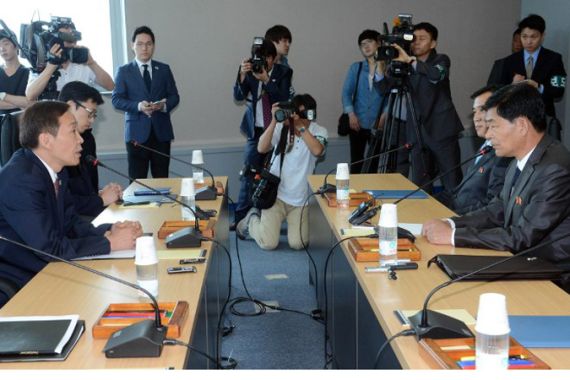Korean talks resume on Kaesong zone
Two sides meet to discuss stalemate over shared complex, a day after Seoul accuses the North Korea of cyber attacks.

North and South Korea have held fresh talks on reopening their joint industrial zone at Kaesong, with low hopes of an early agreement following months of friction.
A fourth round of talks over the complex, a rare symbol of co-operation between the two rivals, took place just across the border in the North on Wednesday. Three previous attempts this month all ended in deadlock.
The talks at the complex, 10km inside the North, come one day after South Korea accused the North of mounting cyber attacks on the websites of its presidential office and other government agencies.
The South said on Tuesday that it had identified signature malicious computer codes and an internet address last month, on the anniversary of the beginning of the 1950-53 Korean War which left the peninsula divided between the rival countries.
Pak Chol-Su, the North’s chief delegate, opened the talks by saying: “The weather is not so bad today, do you think we will have good results today?”
Kim Ki-Woong, his South Korean counterpart, replied: “I hope we’ll be able to build a house that can stand against any gusts of wind or pouring rains.”
The two sides agreed in principle at a meeting this month to reopen the estate, where 53,000 North Koreans worked in 123 South-owned factories producing textiles or light industrial goods.
But little progress has been made since then amid squabbles over which side will take responsibility for the suspension, and Pyongyang’s refusal to accept Seoul’s demand for firm safeguards against another unilateral shutdown.
Seoul also wants to allow foreign firms to operate in Kaesong in an apparent bid to make it more difficult for Pyongyang to shut the estate if relations worsen.
‘Hostile policy’
The North has called for an unconditional and quick restart and blamed Seoul’s “hostile policy” for the suspension and the deadlock in negotiations.
Professor Yang Moo-Jin, of the University of North Korean Studies, said that the fourth and fifth rounds of talks would serve as a “watershed” in attempts to rescue Kaesong, the last remaining symbol of reconciliation.
“Both sides feel pressure to produce some results before the US-South Korea joint military exercise, Ulji Freedom Guide, next month,” Yang said.
The North needs to satisfy a US demand that it improve ties with Seoul before any talks with Washington.
Chang Yong-Seok, a senior researcher at the Institute for Peace and Unification at Seoul National University said that the two sides kept “talking past each other” during negotiations.
“These can hardly be called negotiations but deaf arguments,” Chang said.
Yang said that both leaders of the two sides were taking a strong hands-on approach, “meddling in the talks too intrusively, leaving their delegates little room to wiggle at negotiations”.
Pyongyang proposed last Wednesday separate meetings to discuss the resumption of suspended cross-border tours to its scenic Mount Kumgang resort, and the reunion of families separated since the Korean War.
But it retracted its proposal a day later after Seoul only accepted the offer of talks on family reunions while refusing to discuss the Mount Kumgang tours, another former valued source of hard currency for the impoverished communist state.